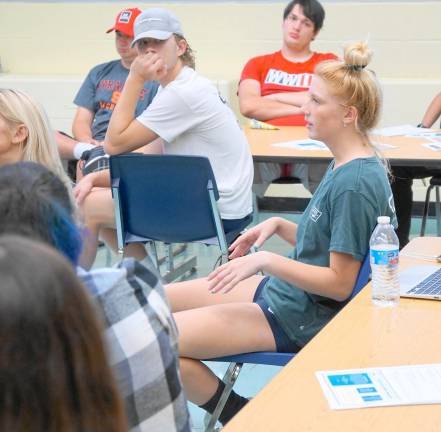Vernon coalition members identify problem areas
Vernon. Teens identify vaping and alcohol as biggest substance issues.

Jeanne Buffalino, with the Municipal Alliance and PAL, conducted a focus group on Wednesday, Sept. 11, during the Vernon Coalition morning meeting, and Vernon Coalition Senior Coordinator Rebecca Dorney conducted a focus group during the evening meeting.
Dorney asked 16 Vernon Coalition members, the majority high school students, four questions; and each member voted for the top two biggest problems in the Vernon community: alcohol use, prescription medication or opiate misuse, marijuana use, or vaping and tobacco use.
Nine out of 16 members chose alcohol as the top issue in Vernon; two out of 16 chose prescription medication or opiate misuse; five out of 16 chose marijuana; and 15 out of 16 chose vaping and tobacco.
In order to receive grants, Dorney said, it is critical for people to be honest about their perceptions of true public health issues. That is how they receive funding, she said, to resolve issues.
The PRIDE survey, she added, will come out in November or December, which the coalition gives every other year.
Their focus group, she explained, was a mini-survey of the perceptions in the room. According to their group, vaping and tobacco are the number one health issue in the Vernon community; number two would be alcohol use; and number three is marijuana.
Prescription medication and opiates, Dorney said, “are a huge deal in the community,” but we can only address and receive funding for two issues right away.
Cynthia Schneider commented that students are stopping vaping because of the recent news regarding others becoming sick.
Room discussion
Dorney asked the room what the number one source of alcohol is, and students responded, “Parents or siblings.”
At one time, Dorney explained, parents did not know about the development of the brain through age 25, and that any substance can rewire the brain. However, she added, a particular population still wants to be “a cool parent;” and “Maybe that person needs to know a little about brain science.”
She continued that Adderall and Ritalin will be the next big epidemic, because any substance can rewire the developing brain. Those individuals who are not misusing it, based on their physician recommendations, she said, need to know they are at a higher risk for future misuse.
Dorney also reviewed “Big Marijuana” is now calling marijuana cannabis in order to avoid the word marijuana, by saying “cannabis is good for you.” Furthermore, she said, people are calling marijuana “weed” because it implies marijuana is natural.
Some teens said they had not encountered prescription medication and opiate problems. The adults, however, were familiar with the transition from prescription medication to heroin.
Dorney said it was something they needed to address through education.
She also asked the students if they would report someone who was dealing a substance. Typically, she explained, someone sells substances in order to maintain a habit; and the person could be screened and helped.
Dorney concluded that for focus groups, one asks very basic questions and lets people have their own opinion and perception.
The High School Youth Action Group meets the second Wednesday of the month at the Board of Education building; and the Vernon Coalition is available in Lounsberry Hollow for fourth- and fifth-grade and Glen Meadow for grades 6, 7, and 8.
Additionally, there will be an update about vaping at the next Vernon Coalition meeting, Oct. 9th.